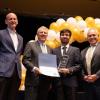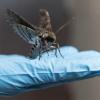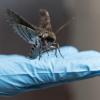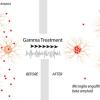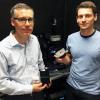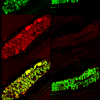News
Since it began in 2019, Georgia Tech and Emory University’s Computational Neural-Engineering Training Program has funded and trained doctoral students at the intersection of neuroscience, engineering, computation, and clinical experience.
Attendees packed the room at the 1st McCamish Parkinson's Disease Conference held at GA Tech on Dec. 5, 2023.
Emory University and Georgia Institute of Technology received a $4.8 million grant from the National Institutes of Health (NIH) BRAIN Initiative to establish a center to make and globally distribute next-generation micro-technologies for neuroscience.
Georgia Tech researchers have joined a cohort of 125 early career scholars who represent the most promising scientific researchers working today.
Study shows good navigators often use a bird’s eye view perspective to organize and remember different places in the environment and have a map-like representation of the environment in their mind.
Markowitz gets $875,000 funding over five years — and the freedom to take risks and explore new frontiers in his research.
Eva Dyer wants to use her NSF CAREER award to address the next challenge.
The five new multidisciplinary Blue Sky research teams bring a broad range of expertise for projects focused on robotics, wearables, assistive communication technology, and advanced personalized therapeutics.
We recently spoke with the NEURO ‘22 Kashlan triplets about their time at Georgia Tech, advice for students, and what’s next on the horizon.
An innovative exploration of technological interventions into the human brain
Serpooshan Lab Creates New 3D-Printed Tool to Study Deadly Pediatric Neuroblastoma
New grant from NIH supporting Cope lab’s work focused on long-term effects from platinum-based cancer drugs
Several College of Sciences students were recognized for excellence this year at the annual Student Honors Celebration on Thursday, April 21.
The Elsevier-VSS Young Investigator Award, sponsored by Vision Research, is given to an early-career vision scientist who has made outstanding contributions to the field.
Brown has won a pair of prestigious research grants from the Curci Foundation and National Institute on Aging — and his lab has new research findings on memory, spatial navigation, and decision-making.
The “Game Changers” episode shows how Ting's team study movement, human balance, and gait.
Georgia Tech has received two Department of Defense (DoD) 2022 Multidisciplinary University Research Initiative (MURI) awards totaling almost $14 million.
Simons Foundation award supports research of information flow along the visual neural highway
Fellows represent just the top 2% of medical and biological engineers in the nation, according to AIMBE.
Hannah Choi is one of the latest Georgia Tech professors to receive a coveted Sloan Research Fellowship, bestowed upon “scientific leaders of tomorrow” for research excellence.
Thanks to the generosity of a Georgia Tech and Emory University alum, the Applied Physiology Ph.D. program at Georgia Tech will work with the Emory University School of Medicine and Shepherd Center to create a new neurorehabilitation training program.
Ritika Chanda shares her experiences in challenging classes, undergraduate research, leadership roles in student organizations, an internship, and more at Georgia Tech.
Haider lab develops tools to study neural traffic jams
New faculty member uses a combination of computational, engineering, and biological approaches to unravel how the brain controls action.
Learn about biology lecturer and director of Outreach for Undergraduate Neuroscience Christina Ragan’s work and approach to outreach — and stop by "Through the Lenses of Your Senses" on March 19.
Jenna Nash shares her experiences before, during, and after Tech — with tips for preparing for graduate school.
Georgia Tech has received two Department of Defense (DoD) 2022 Multidisciplinary University Research Initiative (MURI) awards totaling almost $14 million.
Georgia Tech has received two Department of Defense (DoD) 2022 Multidisciplinary University Research Initiative (MURI) awards totaling almost $14 million.
Students praise Singer for her dedication to creating courses that inspired them to give their best, even when they didn’t know all the answers.
Joined by alumni and friends, the College of Sciences welcomes new professors, presents annual faculty honors alongside inaugural staff and research faculty awards in recognition of individual excellence and community accomplishments.
Both have made bachelor’s degree students a priority in their labs, giving them opportunities to work with graduate students and help produce peer-reviewed research publications.
BME/Petit Institute researcher exploring the role of attention in sensory perception
Computers viewing tiny traits could reveal previously invisible underpinnings of horrible diseases.
Successful reduction of beta amyloid plaques achieved by using flickering light to modulate brain activity and energize immune cells
An electric buzz to the vagus can fight chronic inflammation -- this fine-tune makes it even better.
High performance brain-to-computer interface
25th annual gathering at the Petit Institute featured ground-breaking research in neuroscience
GTNeuro researchers on the cutting edge are exploring the frontier between our ears
Georgia Tech researcher working on a better way to deliver therapeutics for Alzheimer’s disease
BME professor, Petit Institute researcher tapped again for national initiative
Vinayak Agarwal and Bilal Haider among 126 outstanding early-career researchers honored by Alfred P. Sloan Foundation
Groundbreaking research from Ting lab could shed new light on movement disorders
BME assistant professor named Next Generation Leader, invited to participate in advisory council
Georgia Tech researcher one of 18 innovative young scientists in the nation to receive prestigious honor
Stanley lab discovers expanded role for brain’s sensory processing center
Ting is illuminating how the brain works with the nervous and musculoskeletal systems
BME researcher Bilal Haider investigates the mechanisms of how we process what we see
First-time neuro-workshop at Georgia Tech brings together consortium of universities to focus on research, technology, education, and ethics
Georgia Tech and MIT researchers develop noninvasive treatment to improve memory and reduce amyloid plaques in mice
Research from Haider lab demonstrates that visual behavior is impacted by the moment-to-moment state of activity in the primary visual cortex
BME/Petit Institute researcher Chethan Pandarinath awarded NIH Grant to develop brain-machine interfaces for rehabilitation
Automation technology developed in lab of Georgia Tech researcher Craig Forest being commercialized
This blood-brain barrier on a chip represents important features more accurately than animal models and previous chips
The hope of flickering light to treat Alzheimer's takes another step forward in this new study, which reveals stark biochemical mechanisms.
Rozell and Stanley leading five-year, $1.6 million study to develop new algorithms to interact with neural circuitry
Awards recognize work in the genetics of Alzheimer’s disease, the microbiome and stroke, clinical trial design, and more
New model lends additional insight into physiological mechanisms of spasticity in cerebral palsy











